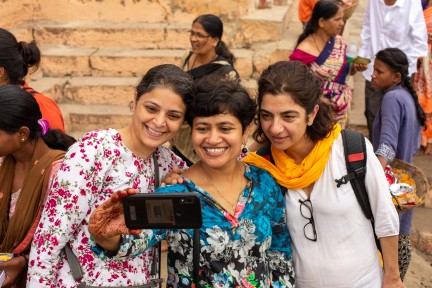Using partnerships to measure impact and outcomes of access programmes
Date
15 November 2022
Gilead and Takeda
Low- and middle-income countries
Establishing partnerships to support monitoring and evaluation of access activities
To determine whether access programmes are successful and identify best practices
Several companies have partnerships to help them measure outcomes for access programmes. Gilead and Takeda go further with partnerships that are increasing their abilities to share knowledge and improve best practice globally. Both companies aim to evaluate access programmes objectively, with a focus on impact and quality of outcomes. For example, this could include evaluating the impact training has on a community, as opposed to quantity and output of activities (i.e., the total number of people trained).
Gilead asked Boston University (BU) to evaluate its access programme for tenofovir disoproxil fumarate (Viread®), with a view of expanding this to other treatments. Within the latest period of the Index analysis, BU’s report highlighted benefits and areas for improvement, finding that voluntary licensing had resulted in “the steepest increases in availability of medicines to patients in need” 1. Gilead has since expanded its voluntary licensing programme to include other HIV therapies and hepatitis C treatments. Following publication of the BU’s report, in 2021-22 two sets of Gilead employees (from its Global Patient Solutions unit and cross-functional partners) attended training sessions by BU researchers in monitoring and evaluation for access activities. Through this partnership, Gilead is identifying best practices and finding ways to incorporate them into ongoing partnership activities.
Takeda leads in its recognition that while more companies are funding access programmes, many are finding it difficult to determine “what works”. In 2019, it began working with Innovations in Healthcare (IiH), a non-profit founded by Duke Medicine, McKinsey & Company and the World Economic Forum, to develop its Access to Health Impact framework. This framework, launched in 2021 and recognised by the Index, can be used to independently measure health system contexts, therapeutic areas and patient experiences.
Takeda has now made its associated guidebook and data collection template available for public use. These enable the design, measuring and evaluation of progress and outcomes for global health programmes sponsored by the private sector. The framework provides metrics to support live adaptations for real-time developments, with the goal of ensuring access programmes have the intended impact and can optimise and maximise resources. Takeda aims to implement the framework across health sectors, and in collaboration with IiH is using the methodology and framework to evaluate outcomes for its flagship Takeda Blueprint for Success, in Meru County, Kenya.
Sharing best practice through collaborations
For companies, there may be challenges in extracting data from access programmes to check whether interventions are working. Partnerships established by Gilead and Takeda show that collaboration can enable more efficient collection of data and be used to evaluate future efforts, even generating tools with wider application. Partnerships can also help to ensure that evaluative work contributes to sharing best practice. The Index looks for companies to engage with relevant and local stakeholders, including universities, to consider local needs and improve access to medicine.
References
1 Wirtz V, Ray M, Rockers P, Laing R. Evaluation of the Gilead Access Program. 2020.

